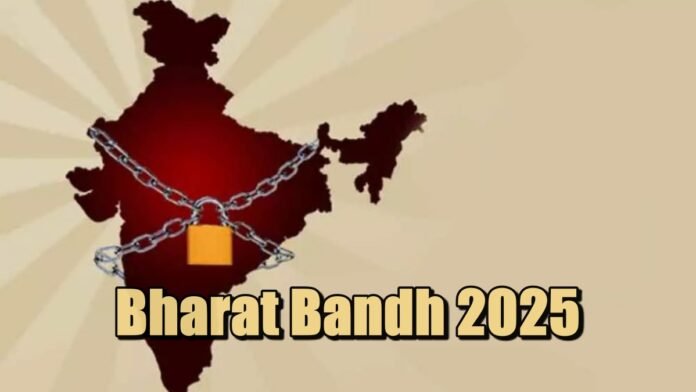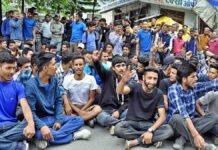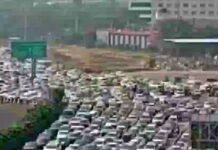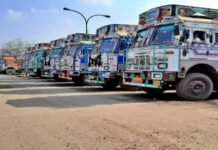
Key Points
- Over 25 crore workers from across India participate in the July 9, 2025, Bharat Bandh.
- Strike led by 10 central trade unions, with support from major farmer and rural labor organizations.
- Major sectors affected: banking, insurance, postal services, coal mining, transport, industrial production, and power supply.
- Protest targets: Central government’s alleged anti-labor, anti-farmer, and pro-corporate policies.
- Mixed impact: Some trade groups claim daily life remains largely unaffected in several regions.
New Delhi: India witnessed a sweeping nationwide strike Bharat Bandh on Wednesday, July 9, 2025, as millions of workers, farmers, and rural laborers united in protest against the central government’s economic and labor policies. The joint action, orchestrated by a coalition of 10 central trade unions and backed by prominent farmer organizations, is being described as one of the largest coordinated strikes in recent years.
Who Is Leading the Strike?
The call for Bharat Bandh was issued by a joint platform of 10 central trade unions, including the All India Trade Union Congress (AITUC), Centre of Indian Trade Unions (CITU), Indian National Trade Union Congress (INTUC), and Hind Mazdoor Sabha, among others. The movement has also garnered support from the Samyukt Kisan Morcha and a range of rural labor unions, amplifying the protest’s reach across both urban and rural India.
Why Are Workers and Farmers Protesting?
Protesters accuse the central government of implementing policies that undermine workers’ rights, neglect farmers’ interests, and favor large corporations. Key demands include:
- Withdrawal of labor code reforms perceived as anti-worker.
- Rollback of farm laws and policies affecting agricultural livelihoods.
- Strengthening of social security and minimum wage guarantees.
- Protection of public sector enterprises from privatization.
Sectors Affected by the Bharat Bandh
The strike has led to disruptions in several crucial sectors:
- Banking and Insurance: Many public sector bank branches and insurance offices remained closed or operated with skeletal staff, affecting transactions and customer services.
- Postal Services: Mail delivery and other postal operations slowed down in multiple states.
- Coal Mining and Industrial Production: Operations in coal mines and factories were partially halted, especially in industrial belts.
- Transport: State-run bus and transport services in some regions saw reduced frequency or complete shutdowns, impacting commuters.
- Power Supply: Reports of reduced manpower at power plants and substations, though no major outages were confirmed as of midday.
Regional Impact and Public Response
While the organizers claim widespread participation, the actual impact varied across states. In industrial hubs like West Bengal, Kerala, and parts of Maharashtra, the bandh saw higher compliance, with rallies, road blockades, and peaceful demonstrations reported. In contrast, several trade chambers and business groups stated that daily life in metros such as Delhi and Mumbai remained largely unaffected, with private sector offices, shops, and transport functioning normally.
Harbhajan Singh Sidhu, a senior leader of the Hind Mazdoor Sabha, stated, “Banking, postal, coal mining, factories, and state transport services are witnessing significant participation in the strike, reflecting the anger of workers and farmers against the government’s policies.”
Government and Trade Organization Reactions
The central government has called for restraint and urged all parties to resolve issues through dialogue. Security was heightened in sensitive areas to prevent any untoward incidents. Meanwhile, some trade organizations downplayed the bandh’s impact, asserting that essential services and most private businesses remained operational.
Timeline of Bharat Bandh 2025
| Time | Event |
|---|---|
| Early Morning | Workers, farmers, and unions stage rallies and blockades |
| 10:00 AM | Banking, postal, and coal mining operations slow down |
| Noon | State transport services disrupted in several regions |
| Afternoon | Protests continue; essential services monitored |
What’s Next?
- Talks Expected: Union leaders have called for urgent dialogue with the government to address their demands.
- Monitoring Impact: Authorities continue to assess the bandh’s effect on essential services and public order.
- Future Protests: Organizers warn of intensified agitation if demands are not met.

















































